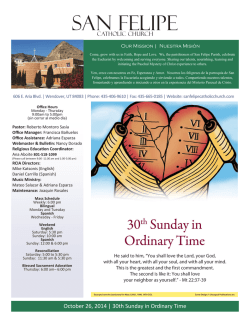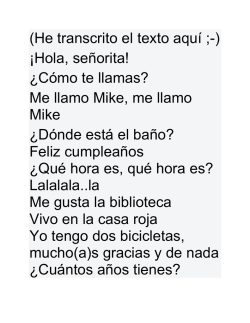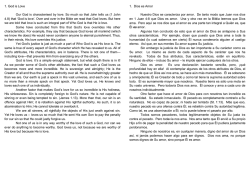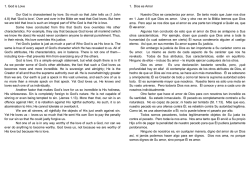
MASS INTENTIONS - St. Patrick Miami Beach
MASS INTENTIONS Saturday, January 10, 2015 8:00 a.m. Yolanda Vazquez Diaz+ 5:00 p.m. Julia Alvarado+, Maria Clara Restrepo (Intentions) Thursday, January 15, 2015 8:00 a.m Anna Maria+, Luigi Lanza+ 7:00 p.m Gustavo Adolfo Ventura+ Sunday, January 11, 2015 Friday, January 16, 2015 8:00 a.m. Mrs. Santiago+ THE BAPTISM OF THE LORD 8:00 a.m. 9:30 a.m. 11:00 a.m 12:30 p.m 7:00 p.m Familia Merlin Moral+ Noemi Mateo+ Sanchez Calderon Family+ Milagros Martin De Diaz+ Maria Elena Restrepo Monday, January 12, 2014 8:00 a.m Felix Alvarez+ Reinaldo Ramirez (Thanksgiving) Tuesday, January 13, 2014 8:00 a.m. Antonietta Almandoz+ 7:00 p.m. Carlos Alberto Alvarez+ Saturday, January 17, 2015 Saint Anthony, Abbot 8:00 a.m. Tim Leahy+ 5:00 p.m. Luis and Virginia Gonzalez+ Sunday, January 18, 2015 8:00 a.m. Brian Thomas Dooley+ 9:30 a.m. Julie Ta+ 11:00 a.m John De Martino+, Simon Rengifo+ 12:30 p.m Cesar Augusto Poma+ 7:00 p.m Cecilia Duarte Acosta+ Wednesday, January 14, 2014 8:00 a.m. Betty Ann Wuest + Mass Schedule January 17-18, 2015 MASS CELEBRANT 5:00 PM Fr. Roberto 8:00 AM Fr. Ivan 9:30 AM Fr. Juan 11:00 AM Fr. Roberto 12:30 PM Fr. Juan 7:00 PM Fr. Roberto READINGS FOR THE WEEK Monday: Heb 1:1-6 / Mk 1:14-20 Tuesday: Heb 2:5-12 / Mk 1:21-28 Wednesday: Heb 2:14-18 / Mk 1:29-39 Thursday: Heb 3:7-14 / Mk 1:40-45 Friday: Heb 4:1-5, 11 / Mk 2:1-12 Saturday: Heb 4:12-16 / Mk 2:13-17 Sunday: 1 Sm 3:3b-10 / 1 Cor 6:13c-15a, 17-20 Jn 1:35-42 WORD FROM THE PASTOR PARISH ACTIVITIES Sanctus Comunidad de Oracion, Formacion y Evangelizacion Jueves de 7:30 p.m a 9:30 p.m. en Barry Hall Dear sisters and brothers in Christ, Women’s Emmaus The Women’s Emmaus monthly meeting in English is the third Saturday of every month in Barry Hall at 8:30 am. I would like to share some excerpts ofPope Benedict’s encyclical God is Love, because as he argues, “in a world where the name of God is sometimes associated with vengeance or even a duty of hatred and violence, this message is both timely and significant.” “God is love, and he who abides in love abides in God, and God abides in him.” These words from the First Letter of John express with remarkable clarity the heart of the Christian faith: the Christian image of God and the resulting image of mankind and its destiny. In the same life: “We have come to know and to believe in the love God hasfor us”. verse, Saint John also offers a kind of summary of the Christian We have come to believe in God's love: in these words the Christian can express the fundamental decision of his life. Being Christian is not the result of an ethical choice or a lofty idea, but the encounter with an event, a person, which gives life a new horizon and a decisive direction. Saint John's Gospel describes that event in these words: “God so loved the world that he gave his only Son, that whoever believes in him should ... have eternal life.” In acknowledging the centrality of love, Christian faith has retained the core of Israel's faith, while at the same time giving it new depth and breadth. The pious Jew prayed daily the words of the Book of Deuteronomy which expressed the heart of his existence: “Hear, O Israel: the Lord our God is one Lord, and you shall love the Lord your God with all your heart, and with all your soul and with all your might.” Jesus united into a single precept this commandment of love for God and the commandment of love for neighbor found in the Book of Leviticus: “You shall love your neighbor as yourself.” Since God has first loved us, love is now no longer a mere “command”; it is the response to the gift of love with which God draws near to us… Mujeres de Emaus Reuniones mensuales el cuarto Sábado de mes, comenzando con la misa a las 8:00 am las 8:30 am en Barry Hall. Hombres de Emaus El Grupo de hombres de Emaus en español se reune los Martes de 7:30 pm- 9:30 pm en Barry Hall Grupo de Oración Inmaculado Corazón de Maria Lunes 7:00 p.m. en Barry Hall LifeTeen Thursdays 7:00 pm Barry Hall CONSEJO #13654 CABALLEROS DE COLON Los terceros Miércoles de cada mes a las 8:00PM, en Barry Hall. God's love for us is fundamental for our lives, and it raises important questions about who God is and who we are. In considering this, we immediately find ourselves hampered by a problem of language. Today, the term “love” has become one of the most frequently used and misused of words, a word to which we attach quite different meanings… Grupo de Renovación Carismatica Martes 7:30 p.m en el Barry Hall Let us first of all bring to mind the vast semantic range of the word “love”: we speak of love of country, love of one's profession, love between friends, love of work, love between parents and children, love between family members, love of neighbor and love of God. Amid this multiplicity of meanings, however, one in particular stands out: love between man and woman, where body and soul are inseparably joined and human beings glimpse an apparently irresistible promise of happiness. This would seem to be the very epitome of love; all other kinds of love immediately seem to fade in comparison. So we need to ask: are all these forms of love basically one, so that love, in its many and varied manifestations, is ultimately a single reality, or are we merely using the same word to designate totally different realities? Fundamentally, “love” is a single reality, but with different dimensions; at different times, one or other dimension may emerge more clearly. Yet when the two dimensions are totally cut off from one another, the result is a caricature or at least an impoverished form of love. And we have also seen, synthetically, that biblical faith does not set up a parallel universe, or one opposed to that primordial human phenomenon which is love, but rather accepts the whole man; it intervenes in his search for love in order to purify it and to reveal new dimensions of it. This newness of biblical faith is shown chiefly in two elements which deserve to be highlighted: the image of God and the image of man. The world of the Bible presents us with a new image of God… There is only one God, the Creator of heaven and earth, who is thus the God of all. Two facts are significant about this statement: all other gods are not God, and the universe in which we live has its source in God and was created by him… So great is God's love for man that by becoming man he follows him even into death, and so reconciles justice and love… The real novelty of the New Testament lies not so much in new ideas as in the figure of Christ himself, who gives flesh and blood to those concepts—an unprecedented realism. In the Old Testament, the novelty of the Bible did not consist merely in abstract notions but in God's unpredictable and in some sense unprecedented activity. This divine activity now takes on dramatic form when, in Jesus Christ, it is God himself who goes in search of the “stray sheep”, a suffering and lost humanity. When Jesus speaks in his parables of the shepherd who goes after the lost sheep, of the woman who looks for the lost coin, of the father who goes to meet and embrace his prodigal son, these are no mere words: they constitute an explanation of his very being and activity. His death on the Cross is the culmination of that turning of God against himself in which he gives himself in order to raise man up and save him. This is love in its most radical form. By contemplating the pierced side of Christ, we can understand the starting-point of this Encyclical Letter: “God is love.” It is there that this truth can be contemplated. It is from there that our definition of love must begin. In this contemplation the Christian discovers the path along which his life and love must move.” Fr. Roberto M. Cid Men’s English Emmaus Monday 6:45p.m. - 9:00 p.m in 2nd floorBarry Hall. Centering Prayer Group Every Thursday at 6:30 pm in the Tower. NA 12 Step Program Friday at 8:00 pm in Barry Hall, first floor Saturday at 8:00 pm in Barry Hall, first floor OUR COMMUNITY Women’s Bible Study in English - Saturdays 10:00 a.m until noon. Tower Conference Room Janurary 17, 24,31 / February 7, 14, 21, 28 For more information, please call Mary Sells at 305-606-5990, or email [email protected]. GIFT SHOP open 9 am to 2 pm on Sundays. La tienda de articulos religiosos y regalos está abierta los Domingos de 9 am a 2 pm. GRIEF GROUP Have you recently experienced the death of a loved one or are you presently dealing with a loved one’s terminal illness? If you are, you need not go through the grieving process alone. The St. Patrick’s Grief Group is meeting again starting on Tuesday, January 6th at 7:30pm in the conference room of the Tower. If you or someone you know might be interested in joining the group, please contact Arthur Gowran at [email protected]. WelcomE Elio I. Carrino - Javier Ley-Soto Sebastian Cuellar - Alejandro Gonzalez to the Parish family through Sacrament of Baptism on January 04, 2015 Grupo de Jovenes Adultos Corazones de Misericordia Viernes a las 7:30 pm en Barry Hall. Grupo de Oración Carismatica: Jueves 10:00 a.m. Barry Hall Grupo de Oración Centrante Lunes a las 6:30 p.m. en la Torre. Respect Life: Thursday at 7:30 p.m. in the Chapel. We invite you to come and pray for life with us. Estudios de Biblia en Español - Viernes 10:00 a.m a 11 a.m. excepto el 2do viernes del mes Barry Hall segundo piso. Our Gift to The Lord Our gift to the Lord for Sunday Collection was $25,272.67 Nuestra Donación de la Colecta del Domingo fue $25,272.67 Our operational expense average is $21,897.00 per week. Nuestros gastos Operacionales Promedio son de $21,897 por semana. Our second collection for St. Vincent de Paul was $6,487.00 PALABRAS DEL PARROCO Queridos hermanos en Cristo: Deseo compartir con Uds. algunos fragmentos de la encíclica Dios es Amor del Papa Benedicto, porque como el mismo señala, “en un mundo en el cual a veces se relaciona el nombre de Dios con la venganza o incluso con la obligación del odio y la violencia, éste es un mensaje de gran actualidad y con un significado muy concreto.” « Dios es amor, y quien permanece en el amor permanece en Dios y Dios en él ». Estas palabras de la Primera carta de Juan expresan con claridad meridiana el corazón de la fe cristiana: la imagen cristiana de Dios y también la consiguiente imagen del hombre y de su camino. Además, en este mismo versículo, Juan nos ofrece, por así decir, una formulación sintética de la existencia cristiana: « Nosotros hemos conocido el amor que Dios nos tiene y hemos creído en él ». Hemos creído en el amor de Dios: así puede expresar el cristiano la opción fundamental de su vida. No se comienza a ser cristiano por una decisión ética o una gran idea, sino por el encuentro con un acontecimiento, con una Persona, que da un nuevo horizonte a la vida y, con ello, una orientación decisiva. En su Evangelio, Juan había expresado este acontecimiento con las siguientes palabras: « Tanto amó Dios al mundo, que entregó a su Hijo único, para que todos los que creen en él tengan vida eterna ». La fe cristiana, poniendo el amor en el centro, ha asumido lo que era el núcleo de la fe de Israel, dándole al mismo tiempo una nueva profundidad y amplitud. En efecto, el israelita creyente reza cada día con las palabras del Libro del Deuteronomio que, como bien sabe, compendian el núcleo de su existencia: « Escucha, Israel: El Señor nuestro Dios es solamente uno. Amarás al Señor con todo el corazón, con toda el alma, con todas las fuerzas ». Jesús, haciendo de ambos un único precepto, ha unido este mandamiento del amor a Dios con el del amor al prójimo, contenido en el Libro del Levítico: « Amarás a tu prójimo como a ti mismo ». Y, puesto que es Dios quien nos ha amado primero, ahora el amor ya no es sólo un « mandamiento », sino la respuesta al don del amor, con el cual viene a nuestro encuentro… El amor de Dios por nosotros es una cuestión fundamental para la vida y plantea preguntas decisivas sobre quién es Dios y quiénes somos nosotros. A este respecto, nos encontramos de entrada ante un problema de lenguaje. El término « amor » se ha convertido hoy en una de las palabras más utilizadas y también de las que más se abusa, a la cual damos acepciones totalmente diferentes… En primer lugar, recordemos el vasto campo semántico de la palabra « amor »: se habla de amor a la patria, de amor por la profesión o el trabajo, de amor entre amigos, entre padres e hijos, entre hermanos y familiares, del amor al prójimo y del amor a Dios. Sin embargo, en toda esta multiplicidad de significados destaca, como arquetipo por excelencia, el amor entre el hombre y la mujer, en el cual intervienen inseparablemente el cuerpo y el alma, y en el que se le abre al ser humano una promesa de felicidad que parece irresistible, en comparación del cual palidecen, a primera vista, todos los demás tipos de amor. Se plantea, entonces, la pregunta: todas estas formas de amor ¿se unifican al final, de algún modo, a pesar de la diversidad de sus manifestaciones, siendo en último término uno solo, o se trata más bien de una misma palabra que utilizamos para indicar realidades totalmente diferentes?... En el fondo, el « amor » es una única realidad, si bien con diversas dimensiones; según los casos, una u otra puede destacar más. Pero cuando las dos dimensiones se separan completamente una de otra, se produce una caricatura o, en todo caso, una forma mermada del amor. También hemos visto sintéticamente que la fe bíblica no construye un mundo paralelo o contrapuesto al fenómeno humano originario del amor, sino que asume a todo el hombre, interviniendo en su búsqueda de amor para purificarla, abriéndole al mismo tiempo nuevas dimensiones. Esta novedad de la fe bíblica se manifiesta sobre todo en dos puntos que merecen ser subrayados: la imagen de Dios y la imagen del hombre. Ante todo, está la nueva imagen de Dios… Existe un solo Dios, que es el Creador del cielo y de la tierra y, por tanto, también es el Dios de todos los hombres. En esta puntualización hay dos elementos singulares: que realmente todos los otros dioses no son Dios y que toda la realidad en la que vivimos se remite a Dios, es creación suya… Dios ama tanto al hombre que, haciéndose hombre él mismo, lo acompaña incluso en la muerte y, de este modo, reconcilia la justicia y el amor. La verdadera originalidad del Nuevo Testamento no consiste en nuevas ideas, sino en la figura misma de Cristo, que da carne y sangre a los conceptos: un realismo inaudito. Tampoco en el Antiguo Testamento la novedad bíblica consiste simplemente en nociones abstractas, sino en la actuación imprevisible y, en cierto sentido inaudita, de Dios. Este actuar de Dios adquiere ahora su forma dramática, puesto que, en Jesucristo, el propio Dios va tras la « oveja perdida », la humanidad doliente y extraviada. Cuando Jesús habla en sus parábolas del pastor que va tras la oveja descarriada, de la mujer que busca el dracma, del padre que sale al encuentro del hijo pródigo y lo abraza, no se trata sólo de meras palabras, sino que es la explicación de su propio ser y actuar. En su muerte en la cruz se realiza ese ponerse Dios contra sí mismo, al entregarse para dar nueva vida al hombre y salvarlo: esto es amor en su forma más radical. Poner la mirada en el costado traspasado de Cristo, del que habla Juan, ayuda a comprender lo que ha sido el punto de partida de esta Carta encíclica: « Dios es amor ». Es allí, en la cruz, donde puede contemplarse esta verdad. Y a partir de allí se debe definir ahora qué es el amor. Y, desde esa mirada, el cristiano encuentra la orientación de su vivir y de su amar. P. Roberto M. Cid ANNUAL WEDDING ANNIVERSARY MASS Our Archbishop Thomas G. Wenski and the Office of Marriage and Family Life invite all couples in the Archdiocese of Miami celebrating their 25th or 50th and above wedding anniversaries this year to join us for a special Mass on Saturday, February 14th 2015 at 5:30 p.m. at St. Mary’s Cathedral. There will be a photo session with Archbishop Wenski starting at 4:00 p.m. before the Mass. Certificates will be distributed after Mass. To register to participate, please contact your parish directly by February 3rd 2015. LA MISA ANUAL DE ANIVERSARIOS DE BODAS de PLATA, ORO y MAS El Arzobispo Thomas G. Wenski y la Oficina de Matrimonio y Vida Familiar invitan a todos los matrimonios de la Arquidiócesis de Miami celebrando sus 25, 50 o más años de matrimonio este año a participar en una Misa especial que celebrará el Sábado 14 de febrero del 2015, a las 5:30pm en la Catedral de St. Mary. Se realizará un sesión de fotografía con el Arzobispo Wenski, comenzando a las 4:00 p.m antes de la Misa. Los certificados se distribuirán después de la Misa. Para inscribirse favor de contactar su parroquia directamente antes del 3 de Febrero del 2015.
© Copyright 2026



